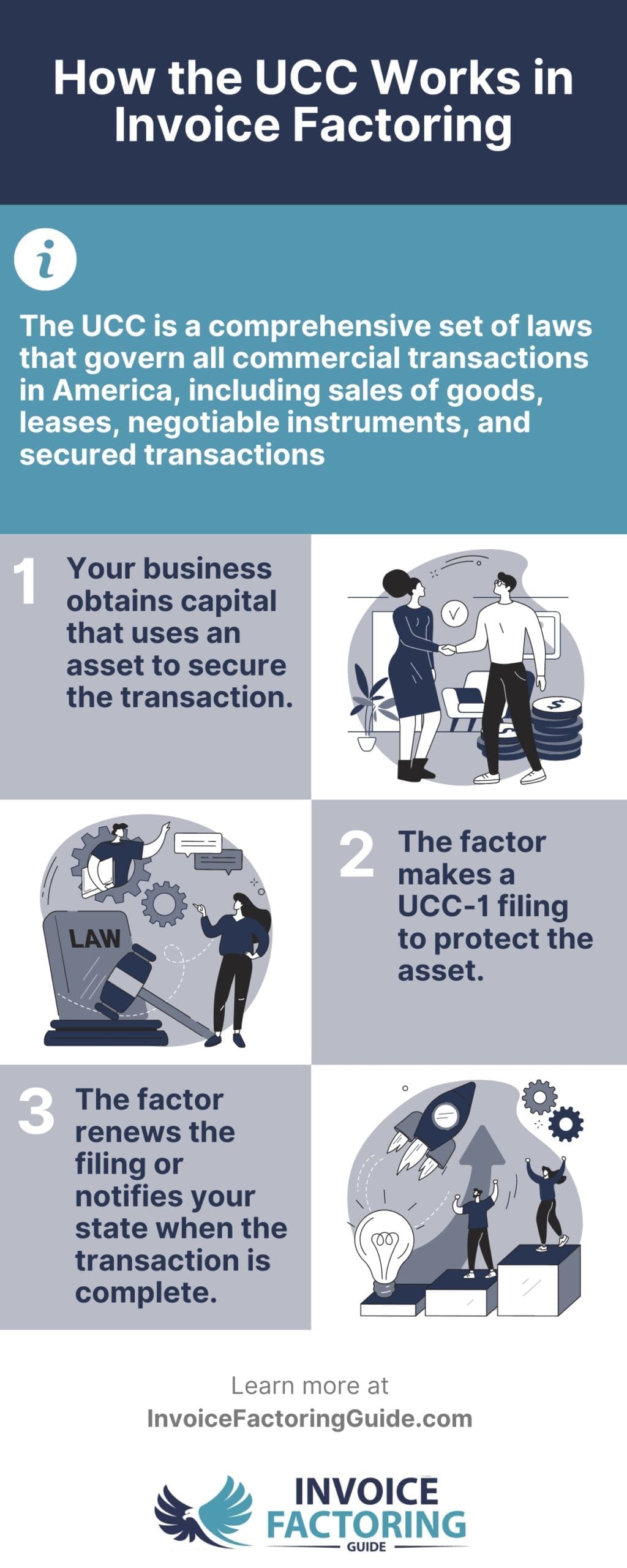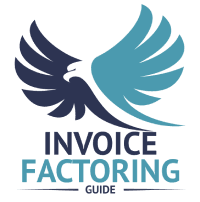
It’s common to hear that Uniform Commercial Code (UCC) filings are necessary for factoring. While they may appear intricate, they’re a routine part of the business world, and your factoring company is there to handle everything for you. Give us a moment, and we’ll guide you through how UCC-1 filings work and cover a few additional areas of regulatory compliance you might encounter during factoring.
Overview of Factoring and Relevant Laws
Factoring, a process where you sell your accounts receivable, or invoices, to a third party, known as a factoring company, or factor, at a discount, can significantly enhance your cash flow. Instead of waiting for clients to pay their invoices, which can easily take 30 to 90 days or more, factoring provides you with immediate funds. This is especially beneficial for businesses that need a steady cash flow to sustain operations, compensate employees, and foster business growth, although businesses of all sizes can leverage it.
Basics of Invoice Factoring Under Legal Frameworks
From a legal standpoint, factoring is significantly influenced by various frameworks, with the Uniform Commercial Code (UCC) playing a pivotal role in the United States. The UCC is a comprehensive set of laws that govern all commercial transactions in America, including sales of goods, leases, negotiable instruments, and secured transactions. Specifically, UCC Article 9, which deals with secured transactions, is essential in factoring. It lays the legal groundwork for creating, perfecting, and enforcing security interests in property, including accounts receivable.
This legal structure ensures that the rights and obligations of all parties in a factoring agreement are clear and enforceable, which is crucial for the integrity and efficiency of these financial transactions.
The Uniform Commercial Code (UCC) in Factoring
Understanding the UCC is crucial for small business owners engaging in factoring transactions because it provides a legal framework that ensures the transactions are conducted smoothly and securely.
How UCC Governs Factoring Transactions
The UCC governs factoring primarily through Article 9, which deals with secured transactions. When a business sells its invoices to a factor, they are considered “accounts” or “collateral” under UCC Article 9. Here’s how it works:
- Attachment: This is the process by which a security interest is created. In factoring, attachment occurs when the agreement is made between the factor and the seller of the invoices (the debtor), the factor has given value (the payment for the invoices), and the debtor has rights in the collateral (the invoices).
- Perfection: After attachment, the factor must “perfect” its security interest to protect its right to the receivables from other creditors. Perfection usually occurs by filing a UCC-1 financing statement with the appropriate state office (usually the Secretary of State where the debtor is located). This filing publicizes the factor’s interest in the receivables to notify other potential creditors about the factor’s legal claim to the assets.
Understanding UCC Filings in Factoring
The UCC-1 financing statement is a critical element in factoring:
- Purpose: Its primary purpose is to perfect a security interest, ensuring that the factor has priority over other creditors in claiming the collateral if the debtor defaults or goes bankrupt.
- Content: The financing statement includes information about the debtor, the creditor (the factor), and the description of the collateral (the accounts receivable).
- Duration: A claim’s perfection through a UCC-1 filing typically lasts five years. If the factoring relationship continues, the filing can be renewed for another five years.
- Impact: If you wish to engage another factor or seek additional financing, the existing UCC-1 filing will show potential financiers that your receivables are already pledged as collateral to another entity. Therefore, managing these filings and understanding their terms and renewal conditions is crucial.
Legal Requirements for Factoring Companies
Like all financial institutions, factoring companies are bound by a range of legal requirements and compliance essentials that govern their operations. These requirements are designed to protect all parties involved—both the businesses selling their receivables and the clients from which they are derived. Some essential legal requirements and compliance aspects factoring companies must adhere to are outlined below.
Licensing and Registration
Factoring companies must typically be registered and licensed under state laws where they operate. This registration often involves demonstrating financial stability and compliance with local commercial codes, including specific provisions under the UCC.
Adherence to UCC Regulations
As discussed, UCC Article 9 requires factoring companies to perfect their security interests in their purchase receivables. This involves making accurate and timely filings of UCC-1 statements. Compliance with these rules ensures the factor’s legal right to collect receivables and sets clear priority rights among creditors.
Transparency and Fair Practices
Factoring companies are also required to operate under principles of transparency and fairness. This includes clear communication about the terms of the factoring agreement, such as advance rates, fees, and handling chargebacks or disputes. Regulations such as the Federal Trade Commission’s regulations on fair debt collection may also apply, especially in how factors interact with the debtors of the invoices they purchase.
Anti-Money Laundering (AML) and Know Your Customer (KYC)
Factoring firms must comply with federal and state anti-money laundering laws. This includes implementing robust KYC procedures to verify their clients’ identities, understand the nature of their clients’ businesses, and monitor ongoing transactions for suspicious activities. These measures are critical in preventing the misuse of financial services for illicit activities.
Data Protection and Privacy Laws
In handling personal and business information, factoring companies must comply with relevant data protection and privacy regulations, such as the General Data Protection Regulation (GDPR) in Europe or state-specific laws in the U.S., like the California Consumer Privacy Act (CCPA). These laws mandate that businesses protect the personal information of individuals and inform them about how their data is used and processed.
Regular Audits and Compliance Checks
Factoring companies often undergo regular audits to ensure ongoing compliance with these diverse requirements. Internal compliance officers or external auditors conduct these audits, verifying adherence to legal standards, financial regulations, and operational best practices.
Navigating UCC-1 Filings in Factoring

Navigating UCC-1 filings is critical to factoring agreements, as these filings play a pivotal role in establishing and maintaining the legal relationship between the factor and the business whose invoices are being factored. Understanding their impact can help small business owners manage their financing relationships effectively and avoid potential pitfalls.
What is a UCC-1 Filing?
A UCC-1 financing statement is a legal form that a creditor (in this case, a factoring company) files to give public notice that it has an interest in a debtor’s assets (your business). Depending on the jurisdiction, this form is filed with a designated public office (typically a Secretary of State or a similar entity). It is crucial to perfecting a security interest under UCC Article 9.
Impact of UCC-1 on Factoring Agreements
- Establishing Priority: The primary role of a UCC-1 filing in factoring is to establish the factor’s priority over the receivables. This means that in the event of the debtor’s bankruptcy or default, the factor has a legally recognized claim to the receivables before other creditors. This priority is critical if other creditors have or might have claims on the same receivables.
- Legal Transparency and Public Notice: Filing a UCC-1 serves as a public declaration of the factor’s interest in the debtor’s receivables. This transparency is intended to prevent other potential creditors from unknowingly extending credit against the same receivables, thereby reducing legal disputes and complications.
- Risk Management for Factoring Companies: From the factor’s perspective, a UCC-1 filing is a risk management tool. It ensures that the factor can recover the amount it has advanced to the business by collecting the receivables if necessary.
- Impact on Business’s Credit and Funding Opportunities: For the business, a UCC-1 filing means that its receivables are officially encumbered. This can affect the business’s ability to obtain other forms of financing, as potential lenders will see the outstanding UCC-1 filings during their due diligence. It can potentially limit the business’s ability to use its receivables as collateral for other loans unless the factor releases the lien or subordinates its position, which factors may be reluctant to do without significant justification.
Navigating UCC-1 Filings in Factoring
- Understand the Terms: Business owners should fully understand the terms under which the UCC-1 is filed, including the duration of the filing and what triggers its release. Knowing when and how these liens can be removed or renegotiated is crucial.
- Monitor and Manage Filings: Businesses should actively manage their UCC-1 filings. This includes checking that filings are accurately done and only cover the appropriate receivables. Businesses should also ensure that UCC-1 filings are terminated when a factoring agreement ends or the debt is paid off.
- Communicate with Other Financiers: If seeking additional financing, it’s important for businesses to communicate with potential new lenders about existing UCC-1 filings. In some cases, arranging for a new lender to take over the factoring company’s position through payoff or subordination agreements might be possible.
- Seek Legal and Financial Advice: Given the complexities associated with UCC-1 filings and their implications, consulting with legal and financial experts can help businesses navigate these waters more effectively, ensuring they maintain healthy financial practices while leveraging factoring services.
Turn Your Receivables into Instant Cash with Factoring
UCC-1 filings may seem complicated, but your factoring company will handle the heavy lifting so you can focus on managing your daily operations and growing your business. To learn more or get started, request a complimentary rate quote.
FAQs: Factoring and the Uniform Commercial Code (UCC)

How does UCC Article 9 apply to factoring?
UCC Article 9 governs secured transactions, including those involving accounts receivable, which are central to factoring agreements. In factoring, when a business sells its invoices to a factor, they serve as collateral. Article 9 outlines the legal framework for creating, perfecting, and enforcing the security interests in these receivables. This includes the factor’s need to file a UCC-1 financing statement to perfect its interest, prioritizing it over other creditors in case of debtor default or bankruptcy.
What is a UCC-1 filing in factoring agreements?
A UCC-1 financing statement is a legal form filed by a creditor (the factoring company) to indicate its right to collect on the debtor’s (your business’s) accounts receivable. This filing is made with a state’s designated filing office. It perfects the factor’s security interest, ensuring its priority against other creditors and providing public notice of its claim on the receivables.
How do I file a UCC-1 for factoring?
To file a UCC-1 for factoring, the factor typically handles the filing process. This includes:
- Completing the UCC-1 form, which requires information about the debtor (your business), the secured party (the factor), and a description of the collateral (the receivables).
- Submitting the form to the appropriate state office, usually the Secretary of State where your business is located.
- Paying a filing fee, which varies by state.
Business owners should ensure that factors file these forms accurately and monitor them for any discrepancies affecting their financial standing.
How does a UCC-1 filing impact my business’s credit?
A UCC-1 filing itself does not directly affect your business credit score. However, it indicates that certain assets (your receivables) are encumbered, which could influence your ability to secure additional financing. Future lenders will see the UCC-1 filing during their due diligence and understand that those assets are pledged to another creditor, potentially affecting the terms or availability of additional credit.
Can a UCC-1 filing affect my ability to get other loans?
Yes, a UCC-1 filing can affect your ability to obtain other loans. Since the filing indicates that specific assets are used as collateral, other lenders may be hesitant to provide additional funding secured by the same assets unless the initial security interest is satisfied or subordinated. Businesses need to manage these filings carefully and may need to negotiate with the factor and other lenders about the order of claims on assets.
How can I terminate a UCC-1 filing?
To terminate a UCC-1 filing, the secured party (the factor) must file a UCC-3 termination statement once the underlying debt obligation is fulfilled and all receivables are paid off. Business owners need to request and ensure that factors file these terminations promptly to clear the public record of any encumbrances on their receivables.
How long does a UCC-1 filing last?
A UCC-1 filing is effective for five years from the date of filing. To maintain the perfected status of the security interest beyond that period, the factor must file a continuation statement (UCC-3) before the expiration of the initial five-year period. If not continued, the filing lapses, and the factor could lose its secured status, making the receivables available for securing other debts.

About Invoice Factoring Guide
Related Articles
Get an instant funding estimate
Results are estimates based on the calculated rate and the total invoice amount provided.
Actual rates may vary.
Request a Factoring Rate Quote
PREFER TO TALK? Call us at 1-844-887-0300










